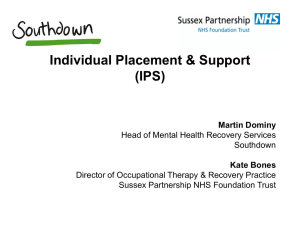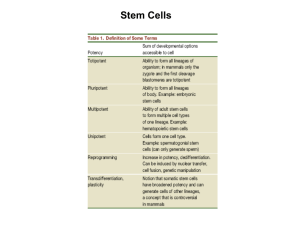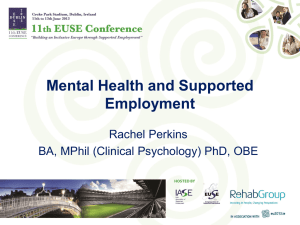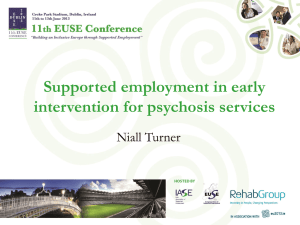`Individual Placement & Support` (IPS)
advertisement
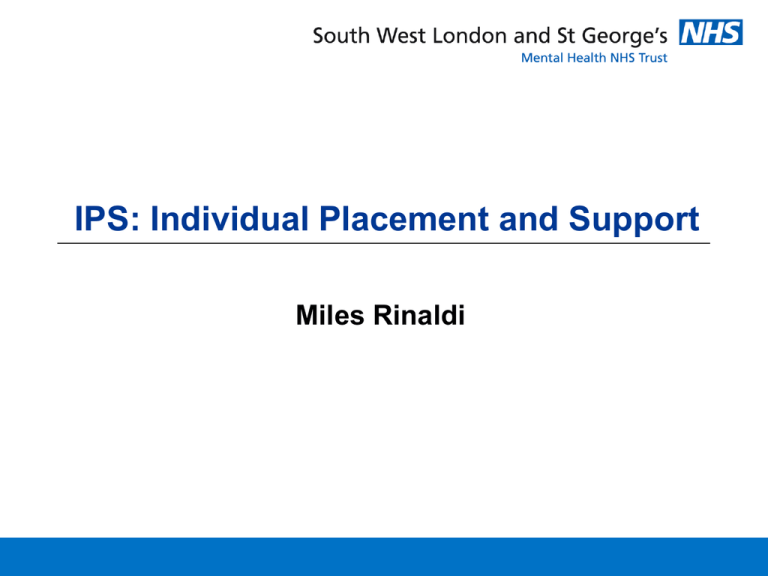
IPS: Individual Placement and Support Miles Rinaldi Individual Placement & Support (IPS) • IPS is a direct, individualised search for competitive employment – Avoids lengthy pre-employment preparation or training – Does not screen people for work ‘readiness’ or ‘employability’ – ‘Place and Train’ not ‘Train and Place’ • It’s evidenced-based • Assumes people can work in ordinary competitive settings • Directly tackles the lack of integration of mental health care and employment services and the disconnection of different specialists • IPS shifts the focus of the mental health system away from treatment onto employment, by demonstrating better employment outcomes. (OECD, 2012) Is employment a realistic goal? Job Ready? • Diagnosis and symptoms do not predict success • Having previously had a job is important but wanting a job and believing that you can work are the best predictors of success (Tsang et al, 2000; McDonald-Wilson et al, 2001; Catty et al, 2008) • Shared decision-making? Is work too stressful? • As compared to what? – If you think work is stressful, try unemployment Golowka, 1999) (Marrone & ‘Individual Placement & Support’ (IPS) • ‘Place and train’ approach not ‘train and place’... – Focus on competitive employment as a primary goal – Eligibility based on the individual’s choice – Rapid job search, minimal pre-vocational training – Integrated into the work of the clinical team – Attention to client preferences – Develop relationships with employers based on client preferences – Availability of time unlimited support – Benefits counselling should be provided to support transition (Bond, 2008) Joe “I was diagnosed with schizophrenia when I was 29 years old. When I met with the Employment Specialist in the [clinical] team he asked what I wanted to do. He advised me to focus on what I would really want to do as it would be good for my health. He then helped me on all aspects such as interview preparation, job searching and contacting employers. He arranged an interview with a care organisation and helped me prepare for this. I was then offered the job which I was very pleased about. I am now 31 and this is my first real job. I am a healthcare support worker and my Employment Specialist supports me and my employer”. Competitive Employment Rates in 16 Randomised Controlled Trials of Individual Placement and Support 90% 80% 70% 60% 50% 40% 30% 20% 10% 0% 96 NH 12 AL 07 IL 04 CT 08 HK 10 CA 08 AUST IP S (Bond et al, 2012) 06 SC Cont rol 99 DC 12 SWZ Cont rol 2 12 CA 07 EUR 06 QUE 10 HOL 02 MD 11 UK Swedish RCT (2014) • N=120 participants randomised to IPS or local vocational service • 18 month follow up • IPS more effective: – Gaining competitive employment: 46% (IPS) Vs 11% (difference 36%, 95% CI 18 – 54). – IPS participants gained employment five times quicker than those in local vocational service • Good fidelity Bejerholm U, Areberg C, Hofgren C, Sandlund M, Rinaldi M. Nord J Psychiatry 2014; Early Online:1–10. Real world... 140 Number of people supported 120 100 1 Employment Specialist across 4 CMHTs 1 Employment Specialist per CMHT 0.5 Employment Specialists per CMHT 80 60 40 20 Apr-05 Feb-05 Dec-04 Oct-04 Aug-04 Jun-04 Apr-04 Feb-04 Dec-03 Oct-03 Aug-03 Jun-03 Apr-03 Feb-03 Dec-02 Oct-02 Aug-02 Jun-02 Apr-02 Feb-02 0 Open employment Mainstyream education/training Mainstream work experience/voluntary work Rinaldi, M. & Perkins, R. (2007) Implementing Evidence Based Supported Employment. Psychiatric Bulletin 31, 244-249 Population impact: One London borough Percentages of long-term clients engaged in work or employment 25 20 15 % 10 5 0 2003 Open employment 2004 Year Mainstream education Rinaldi, Montibeller and Perkins (2011) The Psychiatrist 35, 339-343. 2005 Voluntary Work 2006 Sheltered work Young people with a first episode of psychosis Rinaldi et al. (2010) Journal of Mental Health 19, 6, 483-491. Challenges • National / regional / local systems – Health, Social Care, Welfare systems – Welfare benefits • Myths and assumptions – People with severe mental health conditions cannot work... – If they do it will be stressful and lead to a relapse... – Our job is to protect the public and the individual.... • Local technical issues – Adopting IPS – Early implementation – Persistence / sustainability of implementation Integrated systems • Integrating mental health support and employment support – National, regional, local challenges • Health: focus on treatment and cure • Social Services: ‘care’ for those for who fail to get fully better • Welfare services: adjudge a person’s capability to work • Individual Placement & Support (IPS) is a paradigm shift IPS: Integrated systems • Health, social care and employment support is integrated and provided in parallel • No grounds for selecting people on the basis of their ‘work readiness’ or ‘employability’ • Focus is on competitive employment through job matching based on client skills and preferences, rapid job search and ongoing individualised support • Welfare systems support the transition to employment Societal challenges 7th October 2013 23rd September 2013 Stigma - Prejudice - Discrimination Clinicians’ attitudes... • Clinicians believed that many more people were capable of working than were actually doing so • However, 2/3 believed their caseloads either incapable of working or only able to do voluntary /sheltered work • Clinicians saw helping people get back to work as a core part of their role, but felt they had little relevant training and limited confidence in the vocational services currently available Marwaha et al, 2008 Helping clinicians address ambivalence • Cluster randomised trial. To assess whether motivational interviewing (MI) directed at clinical staff to address ambivalence about employment improved clients occupational outcomes. • All teams delivered IPS but two teams were also trained in MI to improve clinicians skills in targeting young people’s ambivalence about work and study. • N=159 unemployed young people who made a commitment to consider returning to work or study were recruited. Intervention 6 months 12 months IPS (control) 12% 38% IPS + MI (Intervention) 33% 65% Craig, Shepherd, Rinaldi, Smith et al (2014) British Journal of Psychiatry 205, 145-150. Implementation Obstacles • Lack of early intervention • Failure to adopt evidence based practice • Lack of focus on work resumption • Lack of integrated service / fragmented provision • Lack of case management • Low priority for clinicians • Interagency co-operation poor Jason “I was on the ward for three months. I was prescribed risperidone tablets: other patients told me not to take them, but I decided I would. After a while, the psychiatrists said that I was OK, and that I should think about going back to work. I met regularly with my Employment Specialist to look for work and practice my interview skills. I got a job and I enjoy it. I have been there 9 months now. My routine at the moment is great, I feel healthy, happy and positive. I play football once a week and my team is doing well. I still see both the doctor and the Employment Specialist. I feel positive about the future, and have set myself several goals; for example, I would love to go on a holiday as I have never been abroad”. Thank you Miles.Rinaldi@swlstg-tr.nhs.uk

